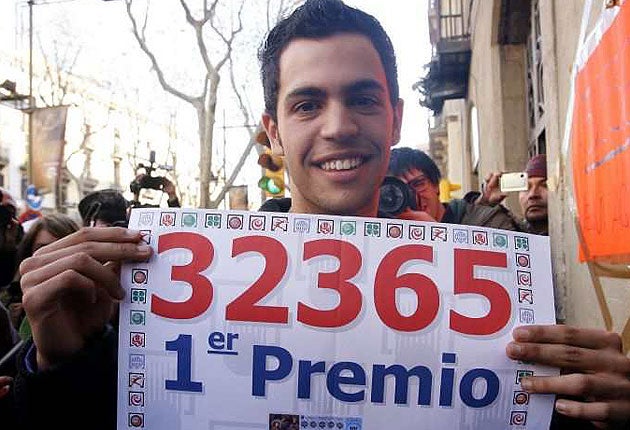Spaniards shrug off gloom with Fat One's fat cheques

Your support helps us to tell the story
From reproductive rights to climate change to Big Tech, The Independent is on the ground when the story is developing. Whether it's investigating the financials of Elon Musk's pro-Trump PAC or producing our latest documentary, 'The A Word', which shines a light on the American women fighting for reproductive rights, we know how important it is to parse out the facts from the messaging.
At such a critical moment in US history, we need reporters on the ground. Your donation allows us to keep sending journalists to speak to both sides of the story.
The Independent is trusted by Americans across the entire political spectrum. And unlike many other quality news outlets, we choose not to lock Americans out of our reporting and analysis with paywalls. We believe quality journalism should be available to everyone, paid for by those who can afford it.
Your support makes all the difference.Spain's traditional Christmas lottery, known as El Gordo, "the Fat One," showered its riches today on the historic centre of Barcelona, making it especially likely that British tourists have a winning stake this year in the 2.32 billion euro pot.
Hundreds of top-prize tickets – worth a total of 384 million euros – were sold at a single vendor on the famed Ramblas thoroughfare, next to the bohemian Raval neighborhood, home to immigrants, students and emerging artists – and popular with many British holidaymakers.
The lucky lottery vendor, Isabel Moliner, rushed to buy bottles of cava, Catalonian sparkling wine, as ecstatic immigrants clutched their winning stubs.
"I'm going to open a restaurant," a man from Bangladesh told a herd of national television cameras. "I'm unemployed," said a man with the winning number, 32365, shaved across the back of his head. "Now I can buy a house and a car."
Moliner expects that some of the prize money fell into the hands of the tourists or expatriates who pass by her state lottery shop.
In Alicante, a British resident of Torrevieja was reported to have been among the top prize winners. The man was said to have purchased a number ending in a five because he was born in 1945.
Each year thousands of foreigners – and three out of four Spaniards -- buy tickets in the world's oldest and richest lottery, a tradition that stretches back to 1812. It has become so famous abroad that consumer groups in the United States, Britain and elsewhere often warn potential lottery players of frauds. And now purchasing the tickets has been made even easier through internet sales.
Despite the economic crisis, a total of 3.32 billion euros in tickets were sold this year – down less than three percent from last year. Many Spaniards hope that a lucky number will boost them into better times.
"There is hardly money for food but it's worth it in case this year we win," said Eusebio Porras Sanz, a 60-year-old flamenco dancer, while queuing at a lottery vendor in Madrid's bustling Puerta del Sol earlier this week. "Hope is a great thing. If you win, you are poor no more".
Indeed, throughout Spain, mortgage troubles, threatened job cuts and other headaches of the economic crisis seemed a far away as millions of euros in prizes graced depressed working class neighborhoods.
In Soria, a city in central Spain, a single bar, Gari, sold 97 million euros worth of third-prize winning tickets. Dozens of happy customers doused themselves with champagne, danced and pounded drums in the street. The owner of the bar declared "drinks on the house" as he, like millions of Spaniards, sat glued to the television set watching the three-hour drawing with 1,787 prizes.
"I'm going to pay off all my debts and then go for a week of skiing – and I'm not going to worry about how much I spend," said one woman dancing outside the bar.
The drama of the day occurred in at a shopping mall outside Madrid, where Carmen, a 70-year-old grandmother-to-be, came running to her lottery vendor in tears. She bought a ticket that won a 100,000 prize, but had left it in the pocket of her housecoat. And washed it. She raced to the shopping mall with the torn bits of the ticket pieced together in a plastic bag. The ticket will be sent to the National Coin and Stamp Factory to determine its authenticity. If so, Carmen said she will use the money to help her unemployed son.
El Gordo creates few millionaires, but it spreads the wealth widely because of a complex pay-out system that divides prize money among 195 series of tickets, each further divided into 10 smaller parts, known as décimos, which cost 20 euros a piece. Many people further subdivide these décimos, like share of stock, among friends, family or clients. This generous division ensures that the bounty is sprinkled among thousands of people – often entire businesses, villages and sporting clubs.
Last year, a cluster of small towns in the northern coal mining region of Asturias won a total of 219 million euros. "It changed our life," said Juan Martinez Serrano, the mayor of the Valdesoto, a few days before yesterday's drawing. "You can see how the money is being spent, you see better cars, a lot home renovations, and even though lightening never strikes twice, the number of people who came here to buy tickets this year is barbarous." Unfortunately for him, it was the one year he neglected to purchase the lottery. "But I was happy anyway to see how it transformed the town," he said.
Join our commenting forum
Join thought-provoking conversations, follow other Independent readers and see their replies
Comments